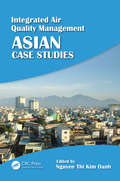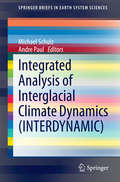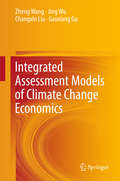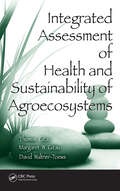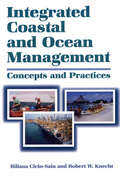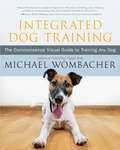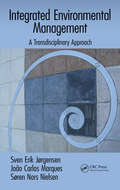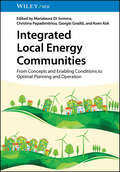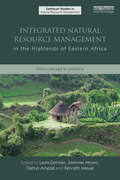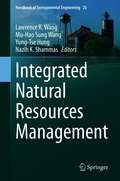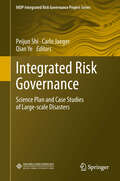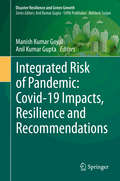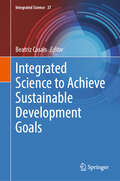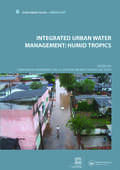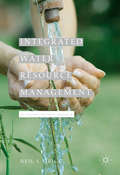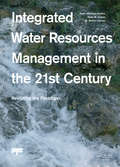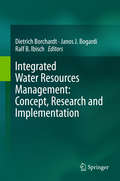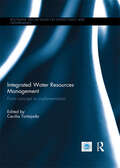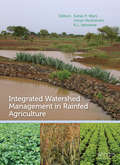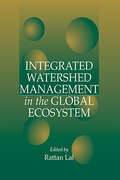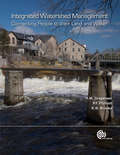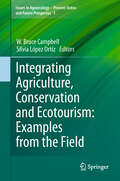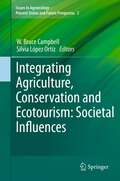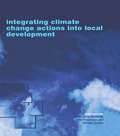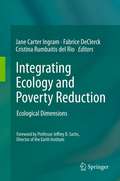- Table View
- List View
Integrated Air Quality Management: Asian Case Studies
by Nguyen Thi Kim OanhThe steady growth in the number of vehicles on the road, heavy reliance on coal, use of dirty fuels for residential combustion, and extensive open burning are some of the major factors leading to the progressive deterioration of air quality in developing countries in Asia. And despite efforts to establish and implement air quality measurement syste
Integrated Analysis of Interglacial Climate Dynamics (INTERDYNAMIC)
by Michael Schulz Andre PaulThe work addresses the following questions in the context of interglacial climate dynamics: (i) What are the amplitudes of natural climate variations on timescales of several years to millennia? (ii) Do abrupt changes in the large-scale circulation of the Atlantic Ocean occur in interglacials? (iii) Which biogeochemical feedback mechanisms control the natural limits of atmospheric concentrations of greenhouse gases and aerosols? (iv) Which linkages exist between climate and pre-industrial cultures? The work is based on an integrated approach in paleoclimate research, in which all available paleoclimate archives (terrestrial and marine as well as ice cores) are combined in order to yield a comprehensive and quantitative analysis of global environmental variations. Moreover, through a close linkage be-tween paleoclimate reconstructions and results from Earth-system models detailed insights into the dynamics of climate variations are gained.
Integrated Assessment Models of Climate Change Economics
by Zheng Wang Jing Wu Changxin Liu Gaoxiang GuThis book describes the principles of integrated assessment models (IAM) for climate change economics and introduces various computable models for different development mechanisms under climate change governance. The authors present several new models they have constructed based on the RICE framework, specifically the MRICES((multi-factor RICE)) and EMRICES models, which incorporate global economic interactions into the RICE framework, and the CINCIA model, which describes technological advances and industrial structure evolution, introducing the mechanism of evolutionary economics. The models discussed in the book help governments and policy-makers tackle climate change and take positive measures on climate governance as well as promote economic and social development to narrow the gaps between countries.
Integrated Assessment of Health and Sustainability of Agroecosystems (Advances in Agroecology)
by David Waltner-Toews Thomas Gitau Margaret W. GitauExploring the implementation of participatory, multistakeholder, and transdisciplinary ecosystem health research, Integrated Assessment of Health and Sustainability of Agroecosystems combines the latest theories in complexity and management with practical tools and approaches for sustainable rural development research.Although the text foc
Integrated Coastal and Ocean Management: Concepts And Practices
by Robert Knecht Biliana Cicin-Sain Gunnar KullenbergBiliana Cicin-Sain and Robert W. Knecht are co-directors of the Center for the Study of Marine Policy at the University of Delaware in Newark, Delaware and co-authors of The Future of U.S. Ocean Policy (Island Press, 1998).
Integrated Dog Training: The Commonsense Visual Guide to Training Any Dog
by Michael WombacherA Comprehensive Dog Training Course in a Book, with Step-by-Step Photos and Guidance Designed for quick reference while working with your dog, this large-format guidebook features the full gamut of training exercises — each illustrated with photos and clear instructions. It offers a wealth of ways to approach various dogs and scenarios, whether you&’re training a puppy to sit or correcting training issues in a mature dog. Michael Wombacher, a trainer with decades of experience, knows all the competing dog training theories but also knows that in reality, it is a range of methods that gets dogs and their humans where they need to be. His Integrated Dog Training is a much-needed commonsense approach that avoids cookie-cutter dictates and recognizes the individuality of each dog. He includes straightforward discussions of situation-specific equipment, treats, and commands, as well as a variety of age- and environment-variable approaches. Easy-to-use, image-driven, and immediately applicable, this is a truly unique, invaluable resource that gets people and dogs in sync and happy lifelong.
Integrated Environmental Management: A Transdisciplinary Approach (Applied Ecology and Environmental Management)
by Søren Nors Nielsen Sven Erik Jörgensen Joao Carlos MarquesBased on 40 years of experience, Integrated Environmental Management: A Transdisciplinary Approach brings together many ecological and technological tool boxes and applies them in a transdisciplinary method. The book demonstrates how to combine continuous improvement management tools and principles with proven environmental assessment methodologies
Integrated Local Energy Communities: From Concepts and Enabling Conditions to Optimal Planning and Operation
by Marialaura Di SommaIntroducing a framework for obtaining and maintaining renewable energy security at the local community level Local energy communities are a framework for assembling and coordinating major stakeholders, individual, corporate, and institutional, in the pursuit of long-term renewable energy and carbon-free projects in a given area. They are aimed at community benefits rather than profit, and have become an invaluable tool in the fight to reimagine the global energy grid, one community at a time. With climate change making this fight ever more urgent, integrated local energy communities (ILECs) that enhance the previous concept through a multi-carrier systems’ approach have never been a more important social force. Integrated Local Energy Communities offers a framework for designing, planning, and operating communities from end to end. Incorporating regulatory and policy issues, the mechanics of local multi-carrier energy systems, social aspects and more, it provides viable solutions to one of the most urgent energy challenges of our time. The result is an indispensable contribution to a potentially transformative process. Integrated Local Energy Communities readers will also find: Comprehensive coverage of all types of energy conversion technologies and processesAnalysis of the entire value chain, from concepts to planning and operationDiscussion of all key factors for integrating the ILEC energy paradigm Integrated Local Energy Communities is ideal for energy engineers, electrical engineers, mechanical engineers, engineering scientists working in consultancy and industry, as well as the libraries that serve them.
Integrated Natural Resource Management in the Highlands of Eastern Africa: From Concept to Practice (Earthscan Studies in Natural Resource Management)
by Laura German Tilahun Amede Jeremias Mowo Kenneth MasukiThis book documents a decade of research, methodological innovation, and lessons learned in an eco-regional research-for-development program operating in the eastern African highlands, the African Highlands Initiative (AHI). It does this through reflections of the protagonists themselves—AHI site teams and partners applying action research to development innovation as a means to enhance the impact of their research. The book summarizes the experiences of farmers, research and development workers and policy and decision-makers who have interacted within an innovation system with the common goal of implementing an integrated approach to natural resource management (NRM) in the humid highlands. This book demonstrates the crucial importance of "approach" in shaping the outcomes of research and development, and distils lessons learned on what works, where and why. It is enriched with examples and case studies from five benchmark sites in Ethiopia, Uganda, Kenya and Tanzania, whose variability provides the reader with an in-depth knowledge of the complexities of integrated NRM in agro-ecosystems that play an important role in the rural economy of the region. It is shown that the struggle to achieve sustainable agricultural development in challenging environments is a complex one, and can only be effectively achieved through combined efforts and commitment of individuals and institutions with complementary roles.
Integrated Natural Resources Management (Handbook of Environmental Engineering #20)
by Lawrence K. Wang Yung-Tse Hung Nazih K. Shammas Mu-Hao Sung WangThis edited book has been designed to serve as a natural resources engineering reference book as well as a supplemental textbook. This volume is part of the Handbook of Environmental Engineering series, an incredible collection of methodologies that study the effects of resources and wastes in their three basic forms: gas, solid, and liquid. It complements two other books in the series including "Natural Resources and Control Processes" and "Environmental and Natural Resources Engineering". Together they serve as a basis for advanced study or specialized investigation of the theory and analysis of various natural resources systems. The purpose of this book is to thoroughly prepare the reader for understanding the topics of global warming, climate change, glacier melting, salmon protection, village-driven latrines, engineers without borders (USA), surface water quality analysis, electrical and electronic wastes treatment, water quality control, tidal rivers and estuaries, geographic information systems, remote sensing applications, water losses investigations, wet infrastructure, lake restoration, acidic water control, biohydrogen production, mixed culture dark anaerobic fermentation, industrial waste recycle, agricultural waste recycle, recycled adsorbents, heavy metals removal, magnetic technology, recycled biohydrogen materials, lignocellulosic biomass, extremely halotolerant bacterial communities, salt pan and salt damaged soil. The chapters provide information on some of the most innovative and ground-breaking advances in resources conversation, protection, recycling, and reuse from a panel of esteemed experts.
Integrated Risk Governance
by Qian Ye Peijun Shi Carlo Jaeger"Integrated Risk Governance: Science Plan and Case Studies of Large-scale Disasters" is the first book in the IHDP-Integrated Risk Governance Project Series. It consists of two parts: Part I: Integrated Risk Governance Project Science Plan, which outlines the challenge, research programme, outcomes, and implementation strategy of the IRG Project; and Part II: Case Studies of Large-scale Disasters, which includes case analyses of experience, lessons learned and recommendations on various large-scale disasters around the world, such as the Tangshan and Wenchuan earthquakes and the great ice storm in China, European heat waves, and Hurricane Katrina in the USA. The community model of integrated natural disaster risk governance and paradigm of catastrophe risk governance in China are also presented. Prof. Peijun Shi works at Beijing Normal University, China; Prof. Carlo Jaeger works at Potsdam Institute for Climate Impact Research, Germany; Prof.Qian Ye works at Beijing Normal University, China.
Integrated Risk of Pandemic: Covid-19 Impacts, Resilience and Recommendations (Disaster Resilience and Green Growth)
by Anil Kumar Gupta Manish Kumar GoyalIn light of the novel corona virus outbreak in December 2019 and its subsequent impact on entire world as a global pandemic, the book attempts to provide integrated risk assessment on Covid -19 like pandemics, as well as to understand the societal, environment and economic impact of the outbreak in various sectors of development. It covers fundamental factors of global disease outbreaks and its coverage as major disaster through the complexity and severity of consequences, illustrating the dimensions of low frequency high intensity disasters. It brings together broad range of topics including basic concepts, isolation measure, role of governance and key technical advancements for containing the diseases. In addition, it also covers resilience analysis towards the impacts such outbreaks have on bio-diversity, ecosystem services and agricultural food production. It defines key exit strategies from the lessons learned and success stories of historical disease outbreaks. The book is presented in four parts, where part 1 familiarizes with fundamentals; part 2 focuses on integrated risk assessments; part 3 focuses on various measures and strategies of resilience; and part 4 suggests key lessons and recommendations. The book is a useful reading reference for scientific community, policy makers and professionals across the domains of health, environment, disasters and sustainable development. Book is specifically beneficial for postgraduate students, researchers, planners and field professionals.
Integrated Science to Achieve Sustainable Development Goals (Integrated Science #37)
by Beatriz CasaisThe book &‘Integrated Science to achieve Sustainable Development Goals&’ debates how different fields of study can confront or mitigate problems or contribute together to the development of society. In brief, it is a book about the interdisciplinarity of knowledge surrounding the topics in society that are involved in the world development agenda. There is an increasing recognition of the importance of achieving the sustainable development goals (SDGs) set in the UN agenda 2030. The book seeks to address the need for the integration of multidisciplinary fields of knowledge to achieve the seventeen SDGs. The book was developed with contributions from established and well-known scholars in different fields. It is interdisciplinary in nature and international in scope, intending to bring out a collection of state-of-the-art/cutting-edge knowledge on policies to achieve the 17 SDGs as well as a range of actionable recommendations for future developments in the different fields with the purpose of addressing the Agenda 2030. The integration of different disciplines (including sociology, health, education, psychology, business, economics, political science, environmental studies and urban planning) in a complex problem like societal development gives this book the challenge to be an authoritative tool with guidelines for the entire community and for policymakers as well. Each chapter presents the state of the art of a topic considered important to achieve SDGs. The authors explain how their field contributes to the achievement of one or more SDGs, including the main theories and examples of empirical evidence that may guide society in using such knowledge to contribute to societal impact.
Integrated Urban Water Management: UNESCO-IHP (Urban Water Series)
by Jonathan N Parkinson; Joel A. Goldenfum Carlos E.M.TucciExcess water in the urban environment results in flooding,which causes structural damage, risks to personal safety and disruption to city life. Water is also a major contributory factor for disease transmission as well as being the medium for transport of many pollutants. These problems are of increasing concern due to climate changes and are parti
Integrated Water Resource Management
by Neil S. GriggThis book addresses the enormous global challenge of providing balanced and sustainable solutions to urgent water problems. The author explores our dependence on access to safe water and other water-related services and how driving forces of the human and natural worlds are degrading this access. The greatest challenges involve conflicts between people and interest groups across all countries, as well as the economic and political difficulties in finding solutions through infrastructure development. The book takes an interdisciplinary approach to Integrated Water Resources Management or IWRM, which provides a set of tools for policy development, planning and organization, assessment, systems analysis, finance, and regulation. The author suggests that IWRM is challenging because of the human element, but that no other process can reconcile the conflicting agendas involved with water management. The broad range of topics covered here, as well as 25 case summaries, will be of interest to scientists, engineers, practitioners, and advanced level students interested in the integrated management of water as a resource.
Integrated Water Resources Management in the 21st Century: Revisiting the paradigm
by Maite M. Aldaya M. Ramón Llamas Pedro Martinez-SantosIntegrated water resources management (IWRM) advocates a coordinated approach for managing water resources in a way that balances social and economic needs with care for nature. While attractive, IWRM is both controversial and elusive. This book provides a down-to-earth approach to the elusive concept of integrated water resources management, drawing from conceptual frameworks and real-life practice to identify the key aspects that are yet to be resolved, it examines the role of water accounting, food trade, environmental externalities and intangible values as key aspects whose resolution will help the IWRM community move forward.
Integrated Water Resources Management: Concept, Research and Implementation
by Dietrich Borchardt Janos J. Bogardi Ralf B. IbischThis book reviews the concept, contemporary research efforts and the implementation of Integrated Water Resources Management (IWRM). The IWRM concept was established as an international guiding water management paradigm in the early 1990ies and has become a vital approach to solving the problems associated with the topic of water. The book summarizes fourteen comprehensive IWRM research projects with worldwide coverage and analyses their motivations, settings, approaches and implementation of results. Aiming to be an up-to-date interdisciplinary scientific reference, this book provides a comprehensive theoretical and empirical analysis of contemporary IWRM research, examples of science based implementations and a synthesis of the lessons learnt. It concludes with some major future challenges, the solving of which will further strengthen the IWRM concept.
Integrated Water Resources Management: From concept to implementation (Routledge Special Issues on Water Policy and Governance)
by Cecilia TortajadaThe book includes seventeen excellent researched and documented papers that reflect the diversity of thought, ideas and experiences related to IWRM. They draw from an extensive, inclusive and geographically representative range of theoretical propositions and practical examples. These include the implementation status of the IWRM concept at local, basin, regional and national levels; its appropriateness for the twenty-first century; main implementation gaps from the institutional, legal, policy, governance, management and technical viewpoints; the likelihood that IWRM’s entrenchment in laws, regulations and policies has led to smoother implementation and the reasons why that has been the case; reflexions on whether the attention given to IWRM is pushing other alternatives to the policy periphery; and the new conceptual constructions that can be put forward for discussion in the international arena.For the development and water communities it is imperative to debate and reach towards more illustrative conclusions regarding whether the promotion of the IWRM concept and its actual implementation status have been beneficial for development and how the notion could evolve to achieve this end. In-depth objective and constructive discussions, arguments, proposals and ideas are put forward for analysis by all interested parties. The book has the objective of fostering scholarly exchange, encouraging intellectual debate and promoting the advancement of knowledge and understanding of IWRM as a concept, as a goal per se and as a strategy towards development goals.This book was published as a special issue of the International Journal of Water Resources Development.
Integrated Watershed Management in Rainfed Agriculture
by Suhas P. Wani Johan Rockstrom Kanwar Lal SahrawatThis book provides a comprehensive presentation of the realization of improved rain fed agriculture yield in semi-arid and dry land areas. Besides techniques to improve the livelihood of small-scale farmers in developing countries, it includes examples and case studies for further support. The methods discussed have shown to be successful and economically remunerative in India and various African countries. Intended for professionals (investors, policy makers), researchers and (post)graduate students working on dry land and sustainable agriculture and water and natural resources management. Suited for courses in dry land agriculture, soil / water management and watershed development.
Integrated Watershed Management in the Global Ecosystem
by Rattan LalFocusing on the technical, social, and economic issues involved in watershed management, this interdisciplinary author team focuses on bettering land use practices and the condition of soil water resources.Integrated Watershed Management in the Global Ecosystem is a volume composed from an international symposium of the world's leading experts
Integrated Watershed Management: Connecting People to Their Land and Water
by Kenneth N. Brooks Hans M. Gregersen Peter F. FolliottGregersen, Folliott, and Brooks provide government agencies and other bodies with background information, factors to be considered, and procedures that facilitate organizing and guiding land and water use in concert with one another. The book can also serve as a reference for planning, monitoring, and implementing development efforts and natural resource management using the integrated watershed management approach. Annotation ©2008 Book News, Inc., Portland, OR (booknews.com)
Integrating Agriculture, Conservation and Ecotourism: Examples from the Field
by W. Bruce Campbell Silvia López OrtízIssues In Agroecology - Present Status and Future Prospectus not only reviews aspects of ecology, but the ecology of sustainable food production systems, and related societal and cultural values. To provide effective communication regarding status and advances in this field, this series connects with many disciplines such as sociology, anthropology, environmental sciences, ethics, agriculture, economics, ecology, rural development, sustainability, policy and education, and integrations of these general themes so as to provide integrated points of view that will help lead to a more sustainable construction of values than conventional economics alone. Such designs are inherently complex and dynamic, and go beyond the individual farm to include landscapes, communities, and biogeographic regions by emphasizing their unique agricultural and ecological values, and their biological, societal, and cultural components and processes.
Integrating Agriculture, Conservation and Ecotourism: Societal Influences
by W. Bruce Campbell Silvia López OrtízAgroecology not only encompasses aspects of ecology, but the ecology of sustainable food production systems, and related societal and cultural values. To provide effective communication regarding status and advances in this field, connections must be established with many disciplines such as sociology, anthropology, environmental sciences, ethics, agriculture, economics, ecology, rural development, sustainability, policy and education, or integrations of these general themes so as to provide integrated points of view that will help lead to a more sustainable construction of values than conventional economics alone. Such designs are inherently complex and dynamic, and go beyond the individual farm to include landscapes, communities, and biogeographic regions by emphasizing their unique agricultural and ecological values, and their biological, societal, and cultural components and processes.
Integrating Climate Change Actions into Local Development
by John Robinson Livia Bizikova Stewart CohenTo date, climate change adaptation and mitigation have been treated separately both in research and in the climate negotiations. However, a growing body of literature is now being developed that points to actual and potential synergies and trade-offs between responses to climate change and sustainability. This literature has evolved in a spontaneous way with diverse approaches and no common methodology to help practitioners explicitly plan for these synergies. This special issue of the Climate Policy journal addresses this gap between scientific knowledge and practitioners' needs by focussing on linkages between climate change and sustainable development at the level of conceptual framework and methods. In particular, the papers address in an integrated way local development options involving both adaptation and mitigation in order to promote resilience to climate change in human and natural systems. The special issue provides policy and methodological guidelines for linking local deveopment pathways with responses to climate change, based on collaboration between local practitioners, the public and scientists.
Integrating Ecology and Poverty Reduction: Ecological Dimensions
by Cristina Rumbaitis del Rio Fabrice Declerck Jane Carter IngramIn the past, the science of ecology has frequently been excluded from the development agenda for various reasons. Increasingly however there has been a renewed interest in finding more ecologically sustainable means of development that have required a strong foundation in ecological knowledge (for example EcoAgriculture Partnerships, EcoHealth presented at ESA, and EcoNutrition proposed by Deckelbaum et al). Each of these examples has already taken the critical first step at integrating ecological knowledge with agriculture, health and nutrition, respectively. However, this is only the first step; more attention needs to be placed not only on the role that two fields can play towards poverty alleviation, but on the role of a truly integrated, interdisciplinary approach towards development goals that is firmly grounded in ecological understanding. We feel that a critical look at what ecology can and cannot provide to the development agenda, in light of the Millennium Development goals, is timely and crucial. The introduction and the final section of the book will then integrate the lessons and principles outlined in each of the chapters. All chapter authors will be heavily encouraged to focus on how their sub-discipline in ecology impacts overall human well-being and environmental sustainability.
